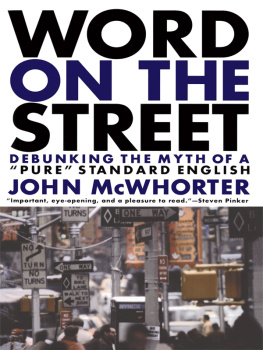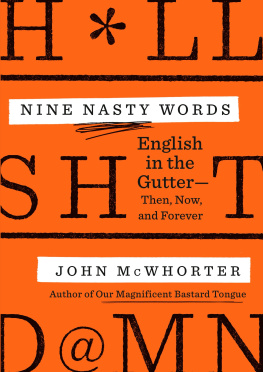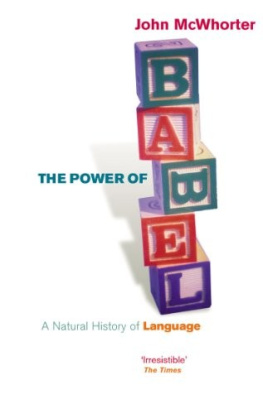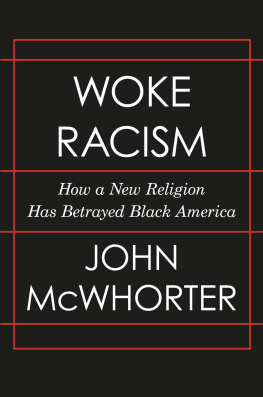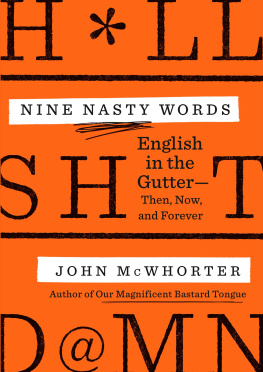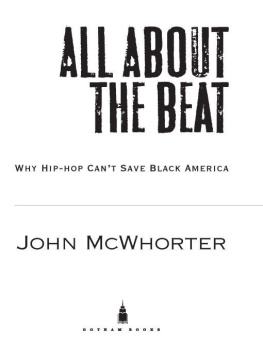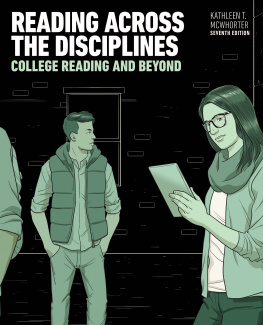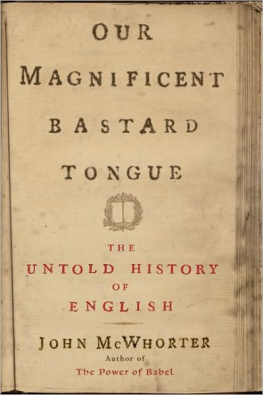Many of the designations used by manufacturers and sellers to distinguish their products are claimed as trademarks. Where those designations appear in this book and Basic Books was aware of a trademark claim, the designations have been printed in initial capital letters.
All rights reserved. No part of this publication may be reproduced, stored in a retrieval system, or transmitted, in any form or by any means, electronic, mechanical, photocopying, recording, or otherwise, without the prior written permission of the publisher. Printed in the United States of America.
CIP information is available from the Library of Congress.
Basic Books is a Member of the Perseus Books Group.
Visit us on the World Wide Web at www.basicbooks.com
Thank you, Dad, for teaching me how to play with both hands.

Introduction
Not long ago, I overheard a woman telling a friend that one reason she couldnt see herself marrying the current man in her life was because his speech was so full of errors, like double negatives and dose for those. She knew that he talked this way because this was the way the people he grew up with had spoken, and that it therefore wasnt his fault. Nevertheless, she had to admit that she just could not imagine spending her life with someone with such faulty speechher mother had simply never allowed such errors in the house.
Every other month, The Atlantic Monthly runs a column called Word Court in which people are told to resist the use of impact as a verb or that the plural of hole-in-one is properly holes-in-one, but that since phrases like two holes in one are potentially confusing, we ought say a hole in one twice.
Several years ago, I spent a memorable Thanksgiving dinner trying to convince twelve African Americans that there was a such thing as Black English. Most of them were offended that I would claim that there was any difference between black and white speech other than slang like funky fresh and macdaddy, and they were perplexed that I would say that phrases like She my sister were systematic language rather than just a sort of jolly in-group bad habit, like sneaking cigarettes after school. After three hours I managed to elicit some grudging agreement, but it was a long and often tense conversation.
It is assumed that English suffers from a mysterious gap, the absence of a gender-neutral singular pronoun. Sentences like Tell any student that he can drop two classes are now rightfully considered sexist, but the result has been an ever-clumsier procession of forced alternates, such as the stiff-backed and still sexist he or she, the unutterable and hideous s/he, the labored alternation of he and she between sentences, and even outright concoctions like co and hesh. Of course in our off moments, what all of us say or write as often as not is Tell any student that they can drop two classesbut officially, this is considered wrong because they is supposedly only a plural pronoun.
The fact is that all of these cases demonstrate the pervasive influences of a number of myths about language, dismissed by all linguists but subscribed to by almost everyone else.
I have come to see this as a wake-up call to the field of modern linguistics. The reasons that linguists scoff at the-sky-is-falling columns like Word Court, do not see dialects as second-class language, and reject the idea that people walk around committing errors in fluent speech all stem from a few basic principles about language that are concretely demonstrable and quite easy to grasp. And yet they remain largely unknown even to the general public regardless of level of education.
Part of the reason for this is that these principles, while simple in themselves, can be difficult to perceive within the context and span of a single lifetime, especially one spent only speaking one language as many Americans do. Like continental drift and heliocentrism, these basic truths about language are large-scale phenomena that are barely perceptible within our daily experience. They only become clear through comparisons, inductions, and trips into the past.
Regardless of the extent to which a linguist might mention these things at a party, on a talk show, or in a quickie letter to the editor, the fact that we all speak language also naturally reinforces our sense that our personal perceptions of it are correct. We cannot help but be a bit skeptical that a linguist has any grounds for judging casual speech, whatever their facility with foreign languages or their expertise in neurological or psychological aspects of language.
Another reason for the gulf between the publics and linguists perceptions of what language is like and how it ought to be is the ever-increasing gulf between academia and the public it was intended to serve. This is unfortunately as typical of linguistics as it is of other fields. Whereas a century ago, even academic papers on linguistics were often accessible to the general reader, todays linguistics is couched in a dense jargon impenetrable to anyone outside of the field (or often, subfield), published in journals unknown outside of linguistics, and summarized in staggeringly expensive books sold only to university libraries. Gone are the days when linguists and other academics regularly offered the public books like Mario Peis The Story of Language and his many others, Robert A. Halls Leave Your Language Alone, Frederick Bodmers The Loom of Language, and Charlton Lairds The Miracle of Language in lucid and engaging prose for people to read on the train or before bed. Like modern literature professors, historians, philosophers, and anthropologists, modern linguists talk almost exclusively to each other.
Thus when aspects of language applicable to daily life are presented to the public, it is usually by people outside of academic linguistics in books on such broad topics as the history of English or languages of the world. Sandwiched in books like this, the principles that would change our entire perspective on what comes out of our mouths all day are generally dwelt on long enough to entertain and provoke, but not long enough to change anyones thinking. (Steven Pinkers chapter The Language Mavens in his best-seller The Language Instinct is a rare exception in that rarity of rarities, a book for the general public by a card-carrying modern linguist. It is but one late chapter, however, in a book mainly devoted to the abstract models of modern linguistic theory.)
Yet these things are among the most valuable insights linguistics has to offer American society today. Specifically the following:
- Any language is always and forever on its way to changing into a new one, with many of the sounds, word meanings, and sentence patterns we process as sloppy and incorrect being the very things that will constitute the proper language of the future.
- Because a language changes in different random directions among different groups, any language is actually a bundle of dialects, none of which can logically be seen as degraded language because they all arise from the same process of gradual, unstoppable change.

